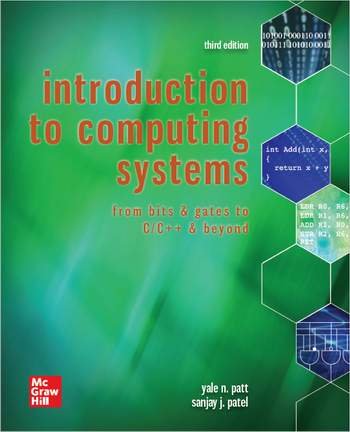CSCI 210: Computer Organization
General Information
 |
Professor: Simon D. Levy
E-mail: simon.d.levy@gmail.com Lecture: MWF 4:00-5:00pm CGL 114 Office Hours: MWF 2:00-4:00pm and by appointment.Zoom meetings are the preferred way to meet for office hours, but I am happy to meet in person given enough notice. |
Textbook: Y.N. Patt and S.J. Patel, Introduction to Computing Systems: From Bits and Gates to C and Beyond, 3rd Edition.
Course Objectives
By the end of this course you will:
-
- Understand the relationship between hardware and software.
- Be able to make use of the binary number system to translate values between the binary and decimal number systems, to perform basic arithmetic operations (i.e. addition, subtraction, multiplication, and division) and to construct machine code instructions.
- Be able to design and implement solutions for basic programs using assembly language with a focus on data storage, selection and repetition constructs, subprograms, and array allocation and processing.
- Be able to design logical expressions and corresponding integrated logic circuits for a variety of problems including the basic components of a CPU such as adders, multiplexers, the ALU, a register file, and memory cells.
- Be able to explain the fetch-execute cycle performed by the CPU and how the various components of the data path are used in this process.
Grading
The work for the course will consist of
-
- Homework assignments, done with your lab partner (both of you turn it in to your github repository by 11:59pm on the due date): 50% of grade
- Two one-hour exams, 15% each = 30% of grade
- Comprehensive final exam: 20% of grade
Accommodations
Washington and Lee University makes reasonable academic accommodations for qualified students with disabilities. All undergraduate accommodations must be approved through the Office of the Dean of the College. Students requesting accommodations for this course should present an official accommodation letter within the first two weeks of the (fall or winter) term and schedule a meeting outside of class time to discuss accommodations. It is the student’s responsibility to present this paperwork in a timely fashion and to follow up about accommodation arrangements. Accommodations for test-taking should be arranged with the professor at least a week before the date of the test or exam.
Final Exam Policy
The final exam for this course will be given during the final exam week. You can take this exam during any of the regularly scheduled exam periods that week. You must supply an exam envelope to the instructor or the department administrative assistant no later than noon on the last day of class. You must specify a provisional day and time on the envelope, which you are free to change on the clipboard provided outside the door of Parmly 407 any time that week. Email or phone requests to reschedule will not be accepted.
The exam will be given in Parmly 405, and you should arrive promptly before the appointed time. If you are more than 15 minutes late, you will have to reschedule your exam. If you are more than 15 minutes late to the last exam period on Friday afternoon, you will receive a grade of 0 on your exam.
Students who have approved academic accommodations must make arrangements to use those accommodations directly with the instructor no later than the last day of class. Students approved for extra time will receive that time at the tail end of the morning exam period or before the beginning of the afternoon exam period (for example, ending at 1:30 PM for a morning exam or beginning at 12:30 PM for an afternoon exam). Students approved for a low-distraction testing location should reserve that space during the last week of classes (following instructions distributed by the Dean’s Office.
Honor System
Unless stated otherwise, the exams will be done without books or notes and without assistance from other people. For the programming assignments you should feel free to discuss approaches with other students, as long as you are not sharing or copying code.
Tentative Schedule